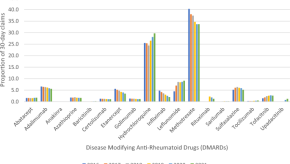All News
Canary in a Coal Mine (4.19.2024)
Dr. Jack Cush reviews regulatory reports, news and novel journal articles - this week focusing on Sjogren's, ILD, Gout and Uveitis.
Read ArticleBSR Guideline on Management of Sjogren’s Syndrome
Sjögren disease (SD) is the most common of all autoimmune disease, yet little is know of its etiology and there are insufficient interventions for those affected with mucosal or systemic manifestations.
Read ArticleBurnout or Retire (4.12.2024)
Dr. Jack Cush reviews the news and journal reports from this past week on RheumNow.com. Is it time to worry about burnout and those who are leaving healthcare?
Read ArticleCBD Products Disappointing for Pain
There is no evidence that CBD products reduce chronic pain, and taking them is a waste of money and potentially harmful to health, according to new research led by the University of Bath in the UK.
Read Article13 Risk Factors for RA-associated Interstitial Lung Disease
Interstitial lung disease (ILD) is the most widespread and fatal pulmonary complication of rheumatoid arthritis (RA). A recent metanalysis shows the pooled prevalence of RA-ILD was approximately 18.7%.
Read ArticleActivity & Pain Tolerance (3.29.2024)
Dr. Jack Cush reviews the news and journal reports from the past week on RheumNow.com, including where you should sit in clinic and why you should worry about secondary Sjogren's in RA.
Read ArticleHigher Rates of Childlessness in Rheumatic Diseases
A large Finnish population study shows that several rheumatic diseases may impair reproduction and pregnancy outcomes, with significantly higher rates of childlessness or fewer children overall for women.
Naysayers & Disrupters (3.22.2024)
Dr. Jack Cush reviews the news and journal reports from the past week - including a few contrary reports on infection, seropositivity and plasmapheresis.
Read ArticleCV Risk Early with Rheumatic Disease Diagnosis
A Finnish populaton study shows that the temporal relationship between cardiovascular (CV) comorbidities in rheumatic diseases (RMD) is seen early after the RMD diagnosis.
Expert Panel Guidance on Managing Psoriatic Arthritis and Comorbidities
An expert panel has published their consensus guidelines for the management of psoriatic arthritis (PsA) and it's comorbidities in the journal Rheumatology.
Read ArticleChronic MSK Pain and Earlier Retirement
Frequent musculoskeletal pain is linked with an increased risk of exiting work and retiring earlier, according to a new study published in the journal PLOS ONE.
Read ArticleTop 10 Pharma R&D Budgets in 2023
Pharma budgets have undergone significant changes coming out of COVID. This year Merck & Co. has knocked Roche from previous years of leading in research and development (R&D) budgets and investments.
Read ArticleUS Trends in RA DMARD Use 2017-2021
A trend analysis of DMARDs shows that only half of rheumatoid arthritis (RA) patients are taking DMARDs, and that the COVID-19 pandemic substantially affected DMARD use. Despite numerous DMARD advances and evolving treatment guidelines since 1990, older therapies are still commonly used and the latest agents make up a small percentage of overall DMARD use.
Read ArticleAgain, a High Mortality with Depression and RA
Last week we reported on a Korean study showing a 66% elevated mortality risk in RA patients (n=38,487) with depression.
Read Article9 Facts about Leflunomide
Medscape has published an informative review of leflunomide, drawn from Dr. Eric Ruderman’s recent lecture on the subject at the February RWCS meeting in Maui.
Read ArticleDepression and RA (3.8.2024)
Dr. Jack Cush reviews the news, journal reports and regulatory approvals from the past week.
Read Article19% Arthritis Prevalence in the USA
According to the National Health Interview Survey (NHIS), in 2022, the prevalence of diagnosed arthritis in adults was 18.9% (women 21.5%, more than men 16.1%). These numbers are down since the CDC's MMWR report of 2019–2021, where is was estimated 21.2% of U.S.
Read ArticleEarly-onset Osteoarthritis is a Growing Health Problem,
Data from the Global Burden of Diseases Study 2019, suggests that early-onset osteoarthritis (OA) (before age 55 yrs) is an emerging health issue that parallels societal problems of obesity.
Read ArticlePreoperative Delay & Education Benefits Arthroplasty Patients
Having patients waiting for knee arthroplasty undergo a preoperative program of weight loss, exercise, and other interventions gave them modestly improved pain, function, and quality of life, a small randomized trial showed.
Read ArticleCOVIDs Extended Risk for Rheumatic Disease
Annals of Internal Medicine reports a large, binational study finding SARS-CoV-2 infection was associated with an increased risk for autoimmune inflammatory rheumatic diseases (AIRDs) that extends up to 12 months after infe
Read Article



















